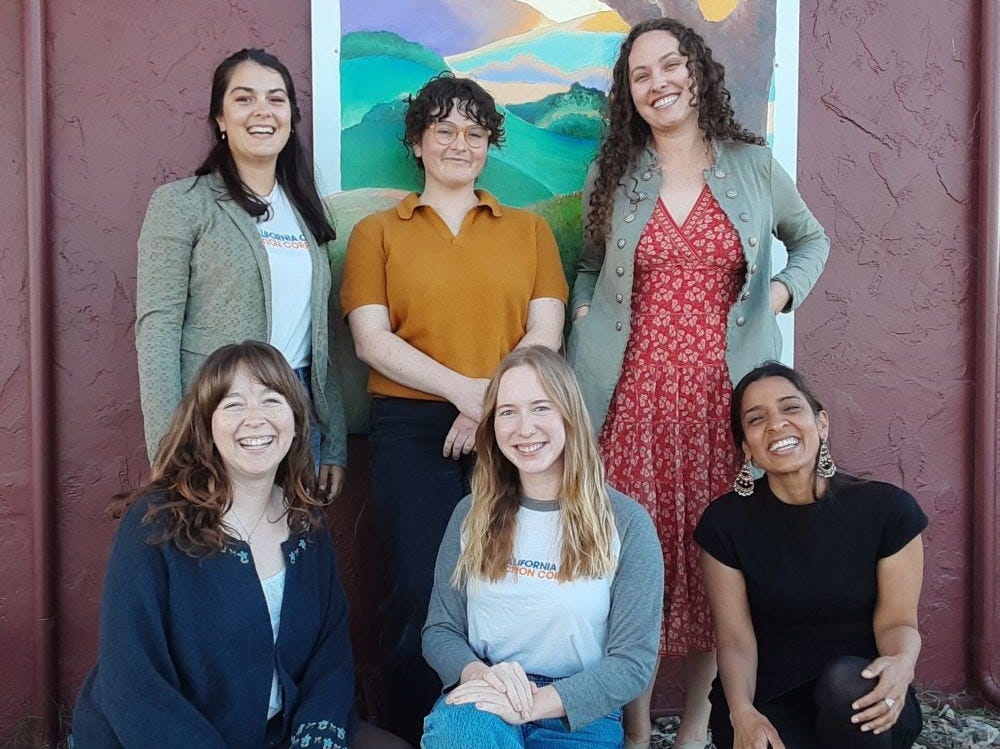Local AmeriCorps fellows work on resiliency in the face of climate change
A presentation last week at the Sebastopol Grange focused on the work of local California Climate Action Corps and Grizzly Corps fellows

By Saba Khalid, Americorps fellow
At the Sebastopol Grange on June 11, a group of soil-under-their-nails climate fellows stood up one by one and reminded us what it means to care. Not performatively, but in gardens, schoolyards, forests, and goat pastures. These are the graduates of California Climate Action Corps and Grizzly Corps — AmeriCorps programs now facing federal defunding.
The evening opened with remarks by Tor Allen, a Sebastopol local and longtime clean energy educator. As founder of the Rahus Institute, Allen has spent decades making solar literacy and energy justice accessible across California. His latest project, Carbon Conversations, invites communities into small group dialogues to process climate grief and reconnect action with meaning.
AmeriCorps is a national service program, founded in 1993. Fellows serve full-time for 11 months and receive a modest living stipend ($2200 a month), health and dental insurance, food assistance, mental health support, loan forbearance, and an education award at the end of service. I plan to use my award to enroll at Santa Rosa Junior College and earn a Child Development Certificate, so I can bring environmental storytelling into schools — sharing the stories of climate activists and asking kids under 10 to help imagine real solutions.
There are two main climate-focused AmeriCorps programs in California: California Climate Action Corps (CCAC) and GrizzlyCorps, which launched at UC Berkeley. GrizzlyCorps focuses more on rural and agricultural resilience, while CCAC works across urban and rural communities on projects ranging from wildfire readiness to edible food recovery. Fellows are matched with local schools, nonprofits, or conservation organizations, who serve as host sites and help train them throughout the year.
In my case, that learning extended far beyond my placement. I spent time meeting nonprofits, reading environmental justice books, watching documentaries, and joining Farm Trails to visit small-scale farms. I went to farmers markets to understand what drives people to stay local — and I traveled to Ukiah, Mendocino, Orr Springs, and Comptche to see how different communities approach sustainability. Along the way, I met local growers and educators I now see as mentors.
Fellows can serve up to two terms, deepening local relationships and building long-term partnerships across the region.
At the grange, the CCAC and GrizzlyCorps fellows spoke about their service, what organization they worked with, and what that work entailed. Here’s a brief summary. (You can also watch the video of the whole event below.)
“I worked with another fellow to build a curriculum on fire safety,” said Alena Brammer of Fire Safe Sonoma. “Our last presentation reached our Spanish-speaking community and young students.”
Her voice, like many others that evening, cracked not with fear but with determination. Because they know what’s coming.
Rose Antaki from Goldridge Resource Conservation District echoed this sense of grounded action. “During my fellowship, I learned how to conduct a defensible space assessment. This skill is important as we work toward wildfire resilience in Sonoma County.”
Emma Guzy from Conservation Works, found herself in classrooms with kids who had never talked about fire safety before. “I worked hard to create a hands-on, safe space for them to explore wildfire. We even played wildfire bingo. It sounds simple, but it worked.”
Others spoke of climate grief — and the antidotes they’d found in storytelling, goats, gardens, and rainwater tanks. “The program allowed me to reconnect with storytelling — a superpower I’ve cultivated over my career, now aimed squarely at climate resilience,” I shared during my talk, reflecting on my journey from flood-prone Pakistan to the redwood-rich lands of Northern California.
Lily Roberts smiled as she described second graders eating veggies straight from the stalk. “We had over 400 students come through our water conservation workshops. The best part? A few days later, we were tabling in Windsor, and the kids came running up with their parents, telling us everything they’d learned.”
These were not interns fetching coffee. They were designing wildfire curricula, hosting bilingual community events, planting hundreds of trees, and teaching kindergarteners why salmon still matter.
Melia Zimmerman put it simply: “Climate anxiety sparked my interest. This project let us put our hearts into something real—something that might just change the world.”
And that’s what hurts. Because even as they speak, the programs that trained and supported these fellows are being quietly dismantled. In April, federal funding for AmeriCorps-backed initiatives like Grizzly Corps was slashed. No headlines. No protests. Just the slow erosion of one of the few things that’s actually working.
So here’s a wild thought: maybe instead of budgeting for billion-dollar bailouts and war machines, we invest in the people planting trees and teaching 8-year-olds about water conservation. Maybe we let the ones who still believe in change lead the way.
Saba Khalid is a former California Climate Action Corps fellow who worked with John Muir Charter School. Originally from Pakistan, she’s a writer, educator, and social entrepreneur, whose past work has focused on reproductive health, youth education, and climate justice.
Thanks to the Rahus Institute for permission to reprint this article.

Getting to know these folks was inspiring for me. Through the Climate & Grizzly Corps programs they learn a lot of skills in one year AND contribute in different ways to building resilience in our communities. We were so inspired that we (through our non-profit Rahus Institute) applied to host several Climate Corps Fellows for the coming year with ideas to create space for local students to work on community connected projects. Alas, the program was hit with cuts at the federal level, which partially funds the CA program. Encouraged by working with these current fellows, we'll keep exploring ways to build resilience in our community engaging all generations. To learn more about the Sebastopol Carbon Conversations series at the Grange, visit this site https://rahus.org/scc/
thanks,
Tor